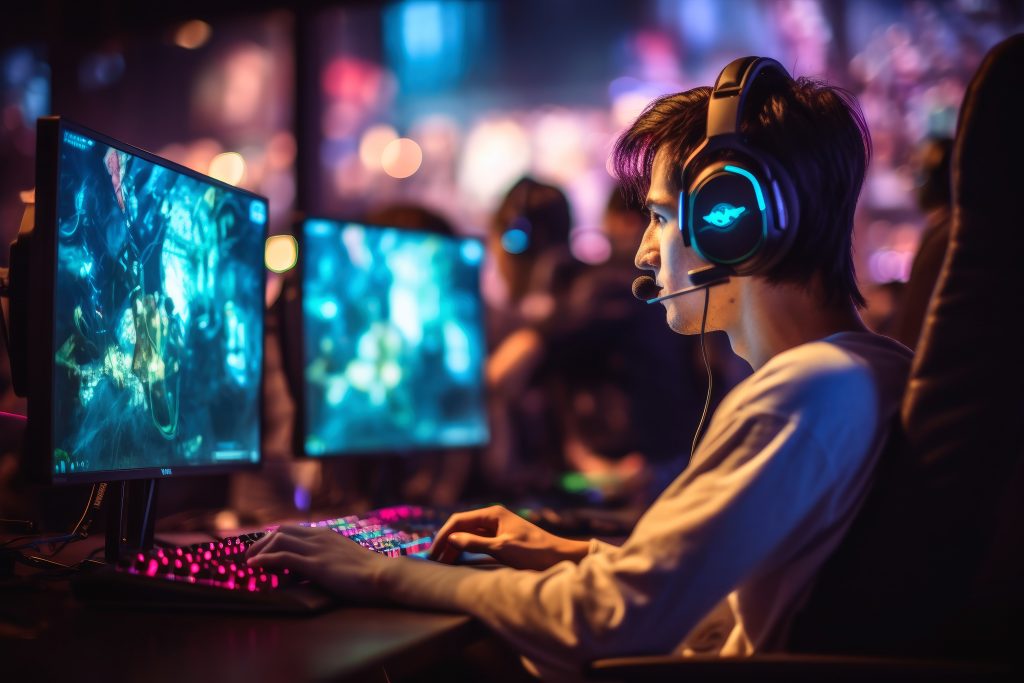In 2022, the University of Surrey and Game Academy Ltd studied the impact of video games on 16,033 participants. The results indicate that interacting with video games can help individuals develop a wide range of non-technical skills (soft skills). These skills can be potentially beneficial in their studies or careers (Johnson et al., 2022): problem-solving, planning, organization, and strategic thinking, among others.
Thus, these results align with previous research by EDHEC conducted in 2020 titled “Work Hard, Play Harder – Video Games as Skill Developers.” It highlights the importance of the skills developed by players depending on their profiles: improvement in memory, attention, and problem-solving skills (Ducheneaut Moore, 2020).
"Work hard, play harder"
The concept of “Work Hard, Play Harder” suggests that intensive engagement in video games can positively influence the development of transferable skills in the professional world. As mentioned, video games promote the development of various soft skills: problem-solving, critical thinking, communication, creativity, adaptability, and stress management.
Thus, by providing clear objectives, graduated challenges, instant feedback, and the possibility of steady progression, video games facilitate learning. They also have the advantage of developing these transferable skills.
Additionally, playing games requires personal discipline, especially when it comes to managing time spent playing and other obligations. Time management and self-discipline are also essential skills in the professional world.
Finally, an affinity for video games allows for ease with digital technology as well as the creation of networks and communities—two significant advantages today. Online multiplayer games indeed help develop networking skills and build communities. They can provide opportunities to work in teams with others, manage interpersonal relationships, and navigate diverse social environments.
The game as a skills generator
The skills acquired through gaming are increasingly recognized by employers. This is highlighted in an article published on Les Echos Start. Indeed, it emphasizes the value of the soft skills developed by gamers, including perseverance, resilience, teamwork, and creativity (Chapelle, 2022).
It is worth noting that another, earlier study highlighted the beneficial effects of video games on hard skills. Conducted in 2007 by researchers from New York Beth Israel Medical Center, it presents the correlation between proficiency in video games and skill in laparoscopic surgery (a minimally invasive surgical procedure).
The study, titled “The Impact of Video Games on Training Surgeons in the 21st Century,” assessed the surgical skills of 33 surgeons. The participants were divided into two groups based on their past experience with video games (gamers and non-gamers). They were then evaluated on specific surgical tasks.
Specifically, the study’s results showed that surgeons who played video games for at least three hours per week made 27% fewer errors and were 39% faster than those who did not have this habit. It appears that the skills developed through playing video games can be transferable to certain surgical practices, such as hand-eye coordination, concentration, precision, and reaction time.
While one should be cautious about drawing hasty conclusions, these studies suggest that integrating serious games or, at the very least, gamified e-learning into a training program is likely to be beneficial!
References
- Johnson, D. et al. (2022). “Video games and skill development: A study of the relationship between video game play and soft skills”. University of Surrey and Game Academy Ltd.
- Ducheneaut, N. Moore, R. (2020). “Work hard, play harder: Video games as skill developer”. EDHEC Business School.
- Chapelle, A. (2022). “Employers valuing video game skills: An emerging trend”. Les Echos Start.
- Michael, D. Chen, S. (2005). “Serious games: Games that educate, train, and inform”. Muska Lipman/Premier-Trade.
- 2007 : “The impact of video games on training surgeons in the 21st century”. James C Rosser Jr , Paul J Lynch, Laurie Cuddihy, Douglas A Gentile, Jonathan Klonsky, Ronald Merrell
- https://start.lesechos.fr/travailler-mieux/recrutements-entretiens/et-si-vos-game-skills-vous-aidaient-a-trouver-un-job-1175540
- https://www.surrey.ac.uk/news/online-gaming-enhances-career-prospects-and-develops-soft-skills-finds-new-study

